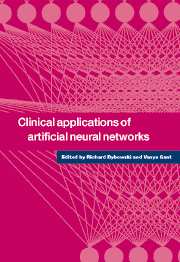Book contents
- Frontmatter
- Contents
- List of contributors
- 1 Introduction
- Part I Applications
- Part II Prospects
- 8 Recent advances in EEG signal analysis and classification
- 9 Adaptive resonance theory: a foundation for ‘apprentice’ systems in clinical decision support?
- 10 Evolving artificial neural networks
- Part III Theory
- Part IV Ethics and clinical prospects
- Index
9 - Adaptive resonance theory: a foundation for ‘apprentice’ systems in clinical decision support?
Published online by Cambridge University Press: 06 October 2009
- Frontmatter
- Contents
- List of contributors
- 1 Introduction
- Part I Applications
- Part II Prospects
- 8 Recent advances in EEG signal analysis and classification
- 9 Adaptive resonance theory: a foundation for ‘apprentice’ systems in clinical decision support?
- 10 Evolving artificial neural networks
- Part III Theory
- Part IV Ethics and clinical prospects
- Index
Summary
Introduction
apprentice n. Learner of a craft. [Old French apprendre]
In the field of clinical decision-making, a decision aid that is able to continue to learn from ‘experience’ is likely to have an advantage over one which is not. For instance, a system that is developed from data gathered at one location should be able, safely, to tune in to local conditions, for example demography elsewhere. Similarly, as practice or technology changes, such changes should be accommodated by the device itself, rather than by having to involve statisticians, knowledge engineers, etc. to rederive algorithms. After all, when doctors change hospital they are not subjected to complete retraining. Neither should a computerized decision aid have to be. Of course, this assumes the need for such systems in the first place, which is a wider question not addressed here. We use the analogy of an apprentice to motivate development of systems that learn in perpetuity.
Expert systems are characterized by the processes of rule elicitation, rule-base development and inference. Knowledge, in the form of rules, is built into the system a priori and, once embedded, remains unchanged throughout the lifetime of the system, unless a knowledge engineer intervenes. Conclusions are drawn by a deductive process. As a model of human expert behaviour this has some drawbacks because it presupposes that once individuals have achieved expert status they no longer continue to learn from their experience.
- Type
- Chapter
- Information
- Clinical Applications of Artificial Neural Networks , pp. 192 - 222Publisher: Cambridge University PressPrint publication year: 2001
- 2
- Cited by



